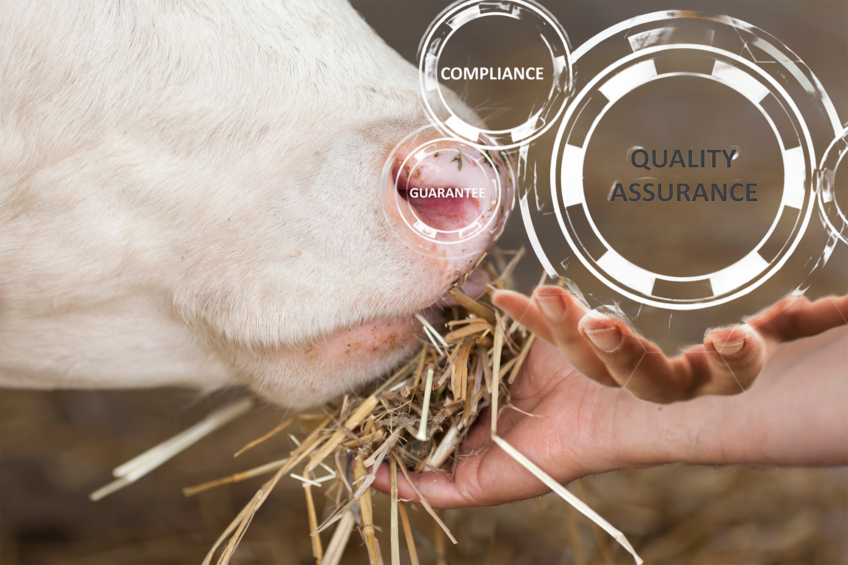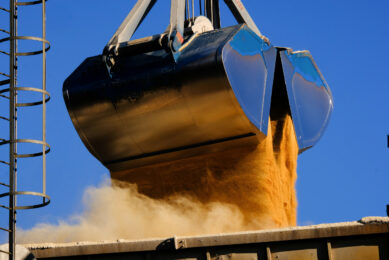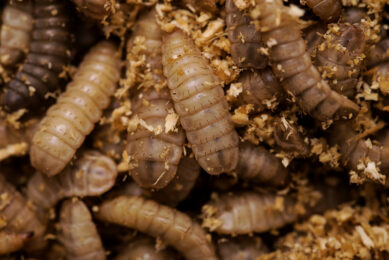Trade assurance schemes underpinning UK feed and food safety

According to a technical report published by the Agricultural Industries Confederation Services, 3 trade assurance schemes have added rigor and instilled confidence in the UK animal feed industry.
Ensuring feed ingredients are responsibly treated post-farm
The study looks at the Feed Materials Assurance Scheme (FEMAS), which covers all feed ingredients for direct feeding or inclusion in compound feed and blends; the Trade Assurance Scheme for Combinable Crops (TASCC), which ensures that crops like grain, oilseeds and pulses are responsibly treated post-farm and the Universal Feed Assurance Scheme (UFAS), which now accounts for more than 95% of commercially produced compound feed in the UK and Ireland, encompassing nearly 1,000 sites.
Scheme created in response to health & safety concerns
Each scheme was developed in the 1990s and 2000s in response to a succession of feed and food safety incidents which put the health and safety of humans and animals at risk, including Salmonella in eggs, Bovine Spongiform Encephalopathy (BSE) and Foot and Mouth disease.
Food standards
In the report’s foreword, Food Standards Agency chair Professor Susan Jebb, said the Agency’s most recent annual report on food standards had shown that the food and feed system had proved extremely resilience, despite the pressure put on global supply chains in recent years.
She said the AIC’s feed and food assurance schemes are an important part of that resilience: “They help to keep standards high and allow resources to be targeted at businesses who are highest risk.”
Recognition of feed assurance schemes
Other organisations have recognised the feed assurance schemes, including Red Tractor, Scottish Quality Crops and Quality Meat Scotland. In addition, the British Egg Industry Council’s Lion Code mandates that farmers purchase feed from certified participants in FEMAS, TASCC or UFAS schemes.
Jim Moseley, Red Tractor chief executive, said AIC Services plays a crucial role in the grain supply chains, providing a trusted and comprehensive system of whole farm assurance, instilling confidence in UK food consumers and delivering enhance value and options to members.
“This partnership strengthens the integrity of the food supply chain, from farms to fork, ensuring the highest standards of quality and safety throughout the production process.”
Tim Oliver , chair of the FEMAS Working Group, said FEMAS had become the leading feed ingredients assurance programme in the UK and Ireland, with participating companies across multiple supply sectors and around the world: “FEMAS is a crucial took in establishing the “due diligence” required by feed safety regulations, a fact recognised by the granting of “earned recognition” from the FSA and other UK devolved authorities.”
Schemes
The 3 schemes are managed by AIC Services in conjunction with the working groups, joint development group and review groups.
Participants of the schemes are routinely for compliance against the Standards, and if successfully completed, receive a certificate of compliance valid for three years.
Challenges and opportunities
The UK’s food and feed assurance sectors faces a complex landscape of challenges and opportunities, according to AIC head of animal feed James McCulloch and head of combinable crops and seed Rose Riby. These are shaped by recent geo-political changes, evolving regulations and global trends in sustainability.
The report highlights 5:
- EU Exit and divergence in legislation – this has had a profound impact on the UK’s food and animal feed assurance schemes, resulting in some cases in increasing divergence across devolved administrations and from the EU. This creates challenges for businesses operating across the UK as they need to navigate multiple and sometimes conflicting, sets of regulations. For instance, the EU and GB now operate separate Catalogues and Registers of feed materials.
- Phytosanitary and Export Health Certificates – this has become a major issue for UK exporters since the EU exit as certificates that verify that plants and plant products are free from disease, are now required for exports to the EU. This has led to additional administrative burdens and costs for UK businesses in the combinable crops and seed sectors.
- Sampling and testing – ensuring the safety and quality of food and animal feed requires rigorous testing and sampling procedures and after the EU-exit, the UK has had to establish its own testing regimes.
- Sustainability – this is an increasingly important aspect of animal feed and food assurance with both consumers and businesses demanding more sustainable practices, from sourcing to production and distribution. With the UK Government demanding net-zero carbon emissions by 2050, developing more sustainable practices, such as reducing the carbon footprint of animal feed material sourcing, efficient production techniques and enhancing the environmental traceability of products in food supply chains will not just meet future regulatory requirements – for instance on deforestation but also enhance the reputation and saleability of UK products in global markets.
- UK organic regulations – with the UK retaining the “old” EU regulation and the EU introducing new organic production rules there has been immediate divergence issues to manage. New production rules, though similar to the current EU standards, will introduce further divergence and could make it more difficult for UK animal feed producers and their livestock farming customers to export to the EU, a key market for organic goods.
Feed incidents
The report highlights past incidents, running from the turkey x disease (deadly aflatoxin in turkey feed) in the 1960s, through to the Newcastle disease outbreak in farmed poultry in the 1970s, the salmonella in eggs and BSE in cattle in the 1980s and 1990s and Foot and Mouth disease in 2001, set against the development of assurance schemes
It says the FEMAS, TASCC and UFAS schemes are being further aligned to ensure consistent and common wording for requirements to meet evolving industry, government and stakeholder needs.
Monitoring
Through UFAS, the feed sector carries out compound feed monitoring of dioxin and mycotoxin.
An AHDB-led project to monitor mycotoxin in UK grown cereals has been running for more than a decade with reports published annually .











